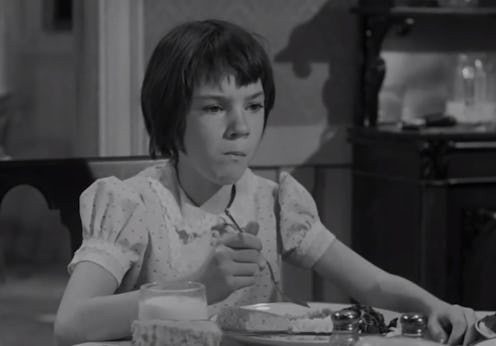Books
What Scout Finch Taught Me

I first read To Kill a Mockingbird in sixth grade. I can't remember who gave me the gray, slightly torn paperback with the strange cover (a tree filled with a ball of string and a pocketwatch, and a mockingbird flying across the night sky), but I remember that it was one of the first "classics" I ever read. It was the first "literary" book in my reading repertoire, which up until then had mostly consisted of Betsy-Tacy, Little House on the Prairie, and the Alice series by Phyllis Reynolds Naylor (all still amazing books, of course). I loved it instantly.
When I was younger, I always wanted a nickname, but "Julia" doesn't really lend itself to one, so the first thing I loved about the book was that Jean Louise went by "Scout." And though I have been an avid reader since I learned to read, Scout was the first character I identified with so much that I actually forced people to call me "Scout" for a while (that didn't last too long, but I'd probably still turn to look if someone shouted the name).
Looking back, it's kind of funny that I was so obsessed with Scout. First of all, she's a total tomboy, which I definitely was not. Sure, I was a bit of a country girl and grew up in a family who often went fishing and camping, but if I was going to go fishing I was probably going to wear a faux fur-trimmed coat and pink sequin dress for the occasion. And I usually preferred not camping to camping, unless of course we were camping at the Disney World campground, in which case I was totally on board. But despite those immediate differences, I now understand why Scout appealed to me so much: she was quirky, and she was an outsider, and her point of view made sense to me. As a nerdy bookworm (and, I'll admit it, a know-it-all), I loved that Scout could read before the other kids. I liked that she didn't quite fit in, and how she was almost more of an observer than a character at times. She was stubborn and opinionated, but sometimes would just watch situations unfold, and those were the traits I saw in myself.
In high school, I once mentioned my passion for To Kill a Mockingbird, and I remember a teacher being surprised that I had read the book in middle school.
"You probably didn't understand it," she said dismissively, and I went home steaming mad. Didn't understand it? Hello, it was my favorite book! Scout was my adopted nickname!
Maybe she was right, though. After all, I was 10 when I read the book, so there was a lot about the world that I didn't understand and hadn't experienced — just like Scout. I considered her the protagonist, and perhaps had a childlike understanding of the dark points of the novel — just like Scout.
But maybe that was the point of telling the story from the perspective of a young girl. I looked up to Atticus, I struggled to understand the injustices in Maycomb, and I realized that there was a lot I didn't know, just from reading a story I thought was about a funny girl like me who liked reading.
Scout Finch taught me to give everyone a chance. Scout Finch taught me to value justice, to fight for what's right, and that maybe a childlike sense of right and wrong is important in a world where we often take things for granted. She taught me that a person can be alienated from a community but still have a lot to offer, she taught me that just because something has "always been done that way" doesn't mean it's the right way, and she taught me that courage, compassion, and strength are important qualities.
I've never reread To Kill a Mockingbird. It's not that I don't want to — the novel has a special place on my shelf next to all my favorite books. The pages are a bit more yellowed now, and the gray cover is even more torn, but it's as familiar to me as any other beloved novel on my shelf — at least, the outside is. Part of me wants the story itself to stay connected to my childhood; I want to remember the story the way I experienced it when I was younger. I want to preserve the mockingbird of innocence.
Harper Lee has been an inspiration to me since I read To Kill a Mockingbird for the first time so many years ago. Her wit and keen observations have stuck with me through many years, as have the lessons I learned through the coming of age of Scout Finch. I may like sparkles and faux fur and dresses, but I learned from Scout Finch that I could still be a scrappy, independent girl no matter how I was dressed. These are the things I remember about the book, but if I revisited the story, perhaps there would be much more waiting for me now.
Maybe it's about time to reread.
Image: Universal (1)